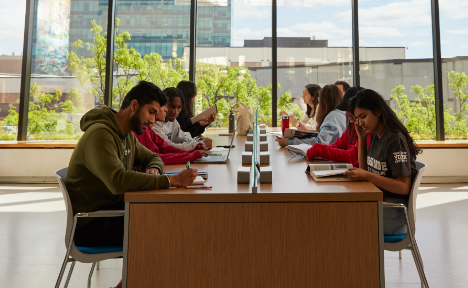York dispose d’options de financement spéciales pour les personnes vivant des défis et expériences diverses.
Because students who are the first in their families to attend postsecondary studies can face significant challenges and barriers, we have dedicated funding to help these generational pioneers reach their goals and start a new tradition in their family.
To be considered for this funding, identify yourself as first-generation student on your sessional Student Financial Profile.
Nous favorisons la réussite de nos étudiants autochtones grâce à diverses initiatives sur le campus, dont un financement spécifique.
La Bourse pour les étudiants et étudiantes autochtones est destinée aux personnes autochtones ayant des besoins financiers qui suivent des programmes postsecondaires et/ou des programmes de formation dans des collèges et universités financés par des fonds publics de l’Ontario ou dans des établissements autochtones approuvés d’enseignement postsecondaire et de formation. Dans le cadre de cette bourse, une personne « autochtone » s’identifie comme appartenant aux Premières Nations, Métis ou Inuits et/ou à leur culture et/ou à leurs origines ancestrales.
Vous devez également résider en Ontario et posséder la citoyenneté canadienne ou la résidence permanence ou encore être une personne protégée.
Comment postuler
Soumettez votre profil financier étudiant en ligne avant le 15 octobre, en précisant que vous êtes autochtone.
Le financement est limité. L’Université l’attribue en fonction des besoins financiers et/ou du niveau d’études. Il se peut que l’on vous demande de fournir des documents confirmant votre admissibilité.
Les personnes retenues seront avisées par courriel en décembre.
Indspire offre un soutien financier aux étudiants et étudiantes des Premières Nations, Inuits et Métis.
Comment postuler
Vous pouvez postuler à la plupart des bourses d’études, bourses d’entretien et prix Indspire à l’aide d’un seul formulaire de demande. La page Web Bourses d’études et bourses d’excellence Indspire contient des renseignements sur les conditions d’admissibilité et les dates limites de dépôt des candidatures.
Trouvez des informations sur les bourses financées par des donateurs dans notre module de recherche de bourses : utilisez des mots-clés comme « autochtone », « métis », « inuit » et « Premières Nations ».
Comment postuler
Soumettez votre profil financier étudiant avant le 15 octobre, en précisant que vous êtes autochtone.
Utilisez l’outil de recherche de bourses pour les Autochtones pour trouver les aides offertes par les gouvernements, les universités, d’autres organisations et des particuliers.
Funding from the Provincial and Federal Government
The Ontario Bursary for Students with Disabilities (BSWD) and the Canada Student Grant for Services and Equipment – Students with Disabilities (CSG-DSE) is a government program that assists students with financial need to meet disability-related educational expenses.
To receive BSWD/CSG-DSE funding you must:
- must register with York’s Student Accessibility Services
- have applied and been deemed eligible for financial aid through one of the following financial aid programs
- OSAP for Full-Time Students,
- OSAP for Part-Time Students; or
- the Institution-Funded Special Bursary; and
- have self-identified as having a permanent disability or a persistent or prolonged disability and your status has been verified through required documentation of a Disability Verification Form for OSAP purposes.
- be a registered student with the same course load you indicated on your financial aid application; and
- have received your first OSAP instalment; and
- have started classes.
To be eligible for CSG-DSE (Federal) funding through the program, a student must have at least $1 in calculated federal need.
To be eligible for BSWD (Provincial) funding through the program, a student must have at least $1 in calculated provincial need.
Set up Electronic Transfer of Funds: Login using your passport York account to update your banking information on the Student Address Module. For more information, please visit the Refunds page.
Maximum Funding
|
If the student has a permanent disability (PD) or persistent or prolonged disability (PPD) and has applied and is eligible for |
Eligible to apply for... |
|---|---|
|
Full-Time (OSAP) loan and/or grants from Canada AND Ontario |
Up to $22,000 |
| Full-Time (OSAP) loan and/or grants from Canada only |
Up to $20,000 |
| Full-Time (OSAP) loan and/or grants from Ontario only |
Up to $2,000 |
|
Part-Time Canada Student Loan and/or grants and Ontario Part-time grant |
Up to $22,000 |
| Part-Time Canada Student Loan and/or grants only |
Up to $20,000 |
| Institution-Funded Special Bursary |
Up to $2,000 |
The bursary assessment is based on funding maximums for each service/technology category.
If you applied for full-time OSAP but did not receive any assistance because your calculated resources were higher than your allowable expenses, you may still qualify for BSWD/CSG-DSE funding. Please ask your York accessibility counsellor for more information.
This funding is only for the specific academic session or term as indicated on your application. You can only use it for the items and/or services that were approved on your bursary application.
You must repay any unused portion of the bursary and you cannot carry it forward to another term. Students can make a payment to their York student account and email bswdaid@yorku.ca once the payment has been made. Make sure to include your student number in your email. Contact Student Support and Advising for more information.
- Set up Electronic Transfer of Funds - Login using your Passport York account to update your banking information in the Student Address Module. For more information, please visit the Refunds page.
- Submit a financial aid application and self-identify as a student with a disability -
- Submit your application for full-time OSAP, part-time OSAP, or the Institution-Funded Special Bursary.
- You must indicate that you have a permanent disability or a persistent or prolonged disability on your application.
- Complete the BSWD/CSG-DSE application with your York accessibility counsellor - Once your financial aid application is submitted, complete the BSWD/CSG-DSE application with your accessibility counsellor. Your counsellor will identify the specific disability-related services or equipment needed to assist you.
- Submit the application - Your accessibility counsellor will submit the BSWD/CSG-DSE application along with any necessary documentation to Student Support and Advising by the application deadline.
- Application review - Student Support and Advising will check your eligibility by ensuring you:
- are progressing well in your academic program.
- have no outstanding disability bursary or OSAP overpayments.
- have no outstanding receipts for purchased disability-related equipment or services.
- are not in default of previous OSAP funding.
- are not submitting duplicate requests.
- Application processing - It usually takes two to three weeks to process your application. The processing of applications is dependent on the release of OSAP funding for the applicable term.
- Decision Notification - You will receive an email informing you of the approval or denial of your application. If approved, the email will detail the approved items and/or services, along with the maximum amounts allocated for each.
Deadline to submit a BSWD/CSG-DSE application is 60 days before the end of your current study period.
Deadline to submit receipts is the end of your approved study period for which the bursary was issued.
You must discuss any changes to the items and/or services on your BSWD/CSG-DSE application with your accessibility counsellor. We do not accept receipts for items and/or services that were not approved on your BSWD/CSG-DSE application.
All receipts must be submitted in PDF format to bswdaid@yorku.ca by the end of your approved study period. Make sure to include your student number in your email.
For one-time purchases such as equipment and software, receipts must be submitted no later than 30 days after the funding is received.
- the date of purchase
- the item purchased
- vendor’s information
- method of payment
- must confirm payment made in full
For on-going expenses such as tutors, note-takers academic strategist/coach should be submitted as soon as services are provided. Recommendation would be at the end of every month.
Receipts for service providers must be submitted with the form below:
Service Provider Receipts (Bursary for Students with Disabilities) Form
Unpaid invoices, quotes and credit card statements are not acceptable proof of payment.
If receipts are not provided or received by the applicable deadline, the Ministry considers the student to have been over awarded, and the student will not be eligible for any further assistance under any OSAP program until receipts are submitted or the overpayment is repaid.
Your eligibility for BSWD/CSG-DSE changes when you drop courses, change your academic program or withdraw from studies.
Receipts dated after you dropped courses might not be accepted.
Stop using your funds and immediately contact Student Support and Advising.
Always keep a copy of receipts from your service providers for your records.
Frequently Asked Questions
No. Please inform Student Financial Services if you wish to cancel your OSAP.
Yes, if you also apply for the associated financial aid application every year.
Yes. Please discuss this with your accessibility counsellor when you apply.
No. You must return the unused portion. Contact your accessibility counsellor to discuss submitting another application for eligibility.
Make a payment to your York student account and email bswdaid@yorku.ca once the payment has been made. Include your student number and the amount you have repaid in your email.
It is your responsibility to pay expenses that exceed the approved amounts for an item or service. For example, if an item is approved for a $150 maximum cost, and you pay $200 for it, then you are responsible for covering the $50 difference between the approved and actual cost.
It is also your responsibility to pay the entire cost for any unapproved item or service you purchase.
No. Ministry guidelines states that family members should not be hired for any approved services.
Other Disability Awards
A number of donor-funded awards are reserved for students with:
- physical, sensory and/or medical disabilities
- learning disabilities
- mental health and psychiatric disabilities.
Preference is typically given to students registered with a recognized York service provider, which is verified during the selection process.
Submit your Student Profile in the Financial Aid, Awards and Scholarships (FAAS) by October 15, noting that you have a permanent disability Indicate the nature of your disability in your personal statement.
You also have the option of submitting a paper version of the Student Financial Profile and/or the Awards for Students with Disabilities application form. Paper copies of both applications are available at the Student Accessibility Services office.
Successful applicants are notified in writing in March.
Scholarships, Awards and Bursaries
Although the words scholarship, award and bursary are often used interchangeably, they are not identical.
|
Aid Type |
Criteria for Aid |
Will it Appear on Your Transcript? |
|---|---|---|
|
Scholarship |
Scholarships are based on merit. They recognize exceptional talent/promise or academic excellence. Some scholarships also consider financial need and/or residency status. |
Yes |
|
Award |
Awards are based on a combination of academic factors and non-academic criteria such as community service, leadership and financial need. |
Yes |
|
Bursary |
Bursaries are primarily for students in good academic standing who have financial need. |
No, for privacy reasons |
Our Undergraduate Bursary Program aims to supplement, not replace, a student’s primary sources of funding such as OSAP, government assistance from other provinces, employment and parental/spousal support. To be considered, applicants must be Canadian citizens, permanent residents or protected persons, who are enrolled in full-time undergraduate studies. Priority for the distribution of financial-need-based awards and bursaries goes to OSAP students who have ‘unmet’ need as defined through the Student Access Guarantee.
La bourse spéciale financée par les établissements (BSFE) offre une aide financière pour couvrir les frais d’études admissibles, comme les droits de scolarité, les manuels, les déplacements et la garde d’enfants.
Vous pouvez recevoir un maximum de 2 500 $ par année universitaire de la BSFE.
Le maintien de votre admissibilité à une BSFE dépend de la réussite de toutes les sessions académiques financées par cette bourse.
Vous pouvez bénéficier d’une BSFE si :
- vous avez la citoyenneté canadienne ou la résidence permanente ou si vous êtes une personne protégée au sens de la Loi sur l’immigration et la protection des réfugiés;
- votre revenu familial est inférieur au seuil fixé pour une certaine taille de famille;
- vous ne bénéficiez pas d’une subvention ou d’un prêt :
- du Régime d’aide financière aux étudiants de l’Ontario;
- d’un programme d’aide financière aux étudiants d’une autre province, d’un autre territoire ou d’un autre pays;
- du Programme de prêts d’études canadiens;
- du programme Meilleurs emplois Ontario (ancien Programme de seconde carrière).
- vous êtes inscrit·e à l’English Language Institute de l’Université York pour suivre des cours d’anglais langue seconde
- vous suivez des cours à York :
- à temps partiel dans le cadre d’un programme d’études postsecondaires menant à un grade, un diplôme ou un certificat; ou
- à temps plein ou à temps partiel pour améliorer vos compétences académiques.
Renseignez-vous auprès des Services de soutien et de conseils aux étudiants pour connaître les programmes approuvés.
- votre période d’études dure au moins quatre semaines.
Vous êtes considéré·e comme étudiant·e à temps partiel si vous êtes inscrit·e à moins de 60 % d’une charge de cours complète (voir Calcul de la charge de cours pour plus d’informations).
Si vous avez un handicap permanent et que vous avez entre 40 et 60 % d’une charge de cours complète, vous pouvez opter pour un statut d’étudiant·e à temps plein ou à temps partiel. Si vous avez opté pour un statut d’étudiant·e à temps partiel, vous pouvez demander une bourse spéciale par l’intermédiaire de la BSFE.
Dans certains cas, des facteurs autres que les cours ou les crédits peuvent être utilisés pour déterminer la charge de cours. Contactez les Services de soutien et de conseils aux étudiants si vous n’arrivez pas à déterminer votre propre charge de cours.
Si vous quittez l’école ou abandonnez un cours, il faudra peut-être rembourser une partie de la BSFE. Il se peut que vous n’ayez pas droit au montant total de la bourse spéciale si vous ne terminez pas le(s) cours comme prévu.
Le financement de la BSFE est imposable. En février, nous vous enverrons un feuillet fiscal T4A indiquant le montant total de la bourse.
Soumettez votre formulaire de demande BSFE dûment rempli aux Services de soutien et de conseils aux étudiants.
Si vous êtes marié·e ou en union de fait, vous et votre conjoint·e devez remplir le formulaire.
Le tableau ci-dessous explique comment remplir certaines sections de la demande. Contactez les Services de soutien et de conseils aux étudiants si vous avez besoin de plus d’informations ou d’aide.
|
SECTION |
RUBRIQUE |
DIRECTIVES |
|---|---|---|
|
1 |
Adresse |
Toute correspondance sera envoyée à l’adresse indiquée dans la demande. |
|
1 |
État matrimonial |
Votre état matrimonial au dernier jour du mois au cours duquel vous commencez votre programme d’études. Si vous vivez en union de fait, cochez la case « Marié·e/en union de fait ». Pour les besoins de la BSFE, l’union de fait signifie que :
|
|
1 |
Statut de citoyenneté |
Si vous êtes une personne protégée au sens du paragraphe 95(2) de la Loi sur l’immigration et la protection des réfugiés du Canada, vous devez fournir une photocopie de votre attestation de statut de personne protégée valide et une photocopie de votre carte d’assurance sociale temporaire. Si vous êtes résident·e permanent·e, vous devez fournir une photocopie de votre dossier d’immigration au Canada ou une photocopie du recto et du verso de votre carte de résident·e permanent·e. |
|
2 |
Type de revenus que vous anticipez percevoir pendant votre programme d’études |
Cochez toutes les cases qui vous concernent. Si vous cochez « Autre », donnez des détails sur le(s) type(s) d’aide que vous comptez recevoir sur une feuille séparée et joignez-la à votre formulaire de demande. |
|
3 |
Type de revenus que vous anticipez percevoir pendant votre programme d’études |
|
|
2 and 3 |
Estimation du revenu brut |
Inclure les revenus provenant de toutes les sources, à l’exception de ce qui suit :
N’incluez pas les indemnités pour souffrance et douleur (y compris les indemnités pour préjudice moral de la CSPAAT) à moins qu’elles ne dépassent 100 000 $. Tout montant supérieur à 100 000 $ est considéré comme un revenu pour la période au cours de laquelle il a été perçu. Si plusieurs paiements sont effectués pour des incidents différents, les paiements liés à chaque incident sont exonérés jusqu’à concurrence de 100 000 $. |
|
6 |
Preuve de l’état civil |
Indiquez le nom et l’adresse de votre conjoint·e (le cas échéant). Si vous êtes marié·e, fournissez une copie de votre acte de mariage. Si vous n’en avez pas, vous devez fournir un affidavit signé par les deux parties confirmant que vous êtes marié·e. Si vous vivez en union de fait, fournissez un affidavit signé par les deux parties qui le confirme. Si vous êtes séparé·e, fournissez une copie de l’accord de séparation légale ou de l’ordonnance du tribunal. Si vous n’en avez pas, vous devez fournir un affidavit indiquant la date de la séparation. Si vous êtes divorcé·e, fournissez une copie du jugement ou de l’ordonnance de divorce. Si vous êtes parent seul soutien de famille et que vous n’avez jamais été marié·e, fournissez un affidavit signé le confirmant. Si vous êtes veuf ou veuve, fournissez une copie de l’acte de décès de votre conjoint·e. Si vous avez des enfants à charge, fournissez une preuve de la date de naissance de votre/vos enfant(s), comme un relevé de la Prestation fiscale canadienne pour enfants. |
|
6 |
Preuve des revenus/prestations indiqués dans votre demande |
Vous devez fournir une preuve de vos revenus et de ceux de votre conjoint·e (y compris votre conjoint·e de fait), le cas échéant. Cela comprend :
Si vous êtes au chômage et que vous bénéficiez de l’aide d’un tiers, vous devez présenter une lettre signée et datée de cette personne confirmant l’aide apportée. |
York University provides one-time, emergency bursary funding to students facing a crisis or unanticipated circumstances. This financial support aims to help students facing unexpected, emergency situations successfully complete their term.
The following emergency funds are available:
- Undergraduate domestic students can apply through the Scholarships and Bursaries team by emailing bursary@yorku.ca. Details on the application process can be found below.
- Graduate students can apply for assistance through the Faculty of Graduate Studies Emergency Bursary. Contact fgseb@yorku.ca to request an online application.
- If you are a part of Schulich or Osgoode, submit one application through the following processes:
- If you are a Schulich Graduate student, contact finaid@schulich.yorku.ca.
- If you are an Osgoode student, apply through Osgoode’s Emergency Bursary Program.
- International students can apply for assistance through the International Student Emergency Bursary.
- Many Faculties also provide emergency bursary funding. Students can contact their home Faculty’s Office of the Dean to inquire about available supports.
Students may apply for bursary support through various departments, but any funding that is issued will be taken into consideration on future applications.
Information for Undergraduate, Domestic Student Applicants
Students should apply if they are faced with:
- An unexpected circumstance that has a widespread impact on a student’s livelihood. (Examples include, but are not limited to, domestic violence, family breakdown, sudden or impending loss of housing, food insecurity, loss of property due to theft or fire or natural disaster etc.)
- An emergency that impacts the student financially in a quantifiable manner (e.g. the amount of aid being requested can be justified).
- A sudden situation that affects the student’s ability to successfully complete their semester.
To be eligible for emergency bursary consideration, a student must:
- Be actively registered in an undergraduate program of study at York University.
- Provide a detailed written statement outlining the nature of the emergency including relevant timelines.
Note: An application for an emergency bursary does not guarantee that students will receive funding. York University reserves the right to determine if funding will be provided and the level of support that will be awarded.
Applicants may be ineligible to receive emergency funding if:
- They have declined to receive available loan funding via government student aid.
- They have received another emergency bursary from York University.
The emergency bursary is not meant to address funding shortfalls where government financial aid (OSAP, out-of-province funding, government social assistance, savings, or employment income) is insufficient to cover educational expenses. This bursary can only be received once and may not cover a student’s entire unmet financial need.
Applicants are strongly encouraged to provide supporting 3rd party documentation with their request and may be asked to do so later. This can include, but is not limited to, police reports, emails, bank statements, invoices/receipts, eviction notice, etc. Documentation should support the emergency at hand, as well as the aid being requested.
- Complete the Undergraduate Bursary Application, if you have not already done so.
- Email the Scholarships and Bursaries team at bursary@yorku.ca with the subject line “Emergency Bursary Request” to submit your request for emergency support.
The email must include:- first and last name
- student number
- a detailed statement outlining the nature of the emergency
- the amount of financial aid that is being requested
Applicants are strongly encouraged to provide supporting 3rd party documentation with their request and may be asked to do so later. This can include, but is not limited to, police reports, emails, bank statements, invoices/receipts, eviction notice, etc. Documentation should support the emergency at hand, as well as the aid being requested.
- Be available for a virtual meeting (via Zoom or Microsoft Teams), if requested.
- Final decisions will be shared by email. All decisions are final.
All applicants to the emergency bursary will receive a decision by email within 3 business days. The amount of funding issued will depend on the situation as assessed by the Scholarships team.
Students who have not already done so will be asked to provide the university with their banking information.
Eligible emergency bursary recipients will receive their funds via Electronic Funds Transfer (EFT) and the university will directly deposit funds into the recipients’ personal bank account (within 5 business days). Disbursement of funds may be delayed if banking information is not set up accordingly.
OSAP Recipients
York University reports all awards, scholarships and bursaries issued by York University to the Ministry on your behalf.
Students will not need to report funding received through the bursary on their OSAP application. A student’s OSAP will not be impacted if they are a successful bursary recipient as funding issued as an emergency bursary is exempt as study period income.
If York-issued funding was reported on a student’s OSAP application, York can update the application on the student’s behalf. Please complete the Income Change Request Form.
Financial challenges may accompany other personal struggles students are facing. Below are several resources available at York:
- The Office of Student Community Relations supports students requiring assistance with navigating support resources, including financial supports, housing challenges, mental health supports or other services.
- Student Counselling, Health & Well-being supports students in need of health and well-being services.
- The Centre for Sexual Violence Response, Support & Education supports community members who have experienced sexual or gender-based violence
- Food support resources can be found across York’s campuses
- Other campus and local community services and resources





Connect with York University